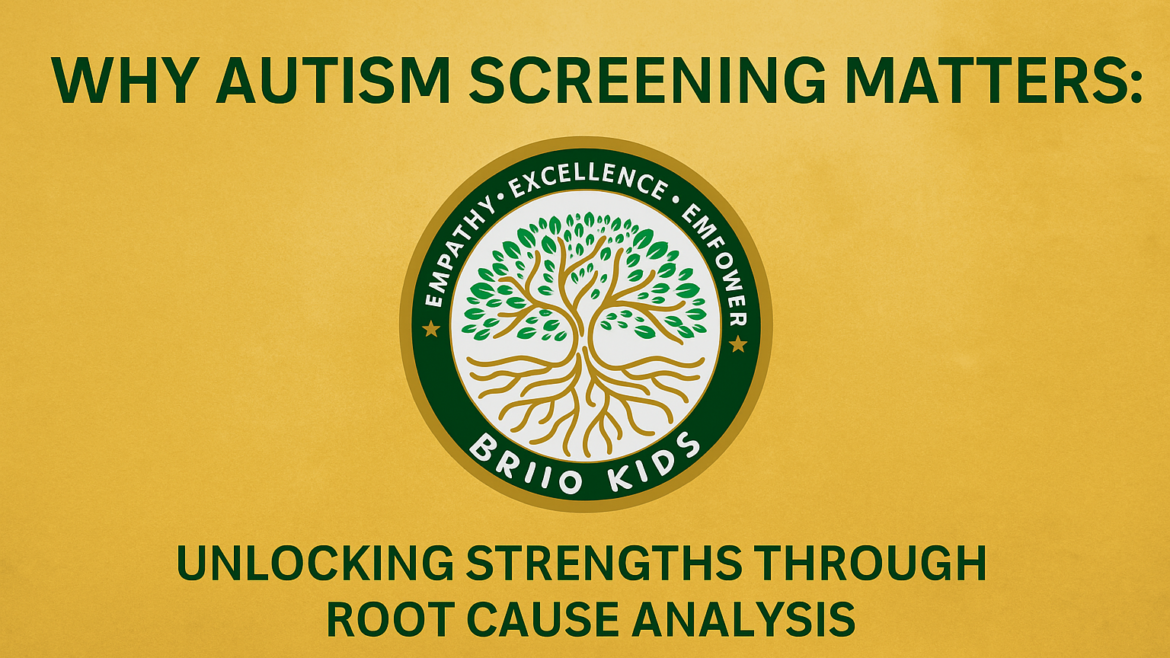Introduction: Screening Isn’t Just a Diagnosis—It’s a Discovery
As parents, when we hear words like “autism,”“neurodivergent,” or “developmental delay,” it’s natural to feel uncertain. But what if screening didn’t mean something’s wrong—but that something is different, and beautiful?
In 2025, more parents are searching terms like “why screen for neurodivergence” and “benefits of autism diagnosis”—a sign of growing curiosity, not just concern. At Brio Kids, we’ve seen firsthand how early autism screening, supported by root cause analysis, doesn’t just identify challenges—it uncovers potential.
Why This Blog Matters
Autism is a spectrum. Every child is unique. So, when we screen, we’re not labeling. We’re decoding.
Here’s what this blog will explore:
- Why autism screening is about understanding, not judging
- How root cause analysis reveals the why behind behaviors
- The benefits of neurodivergent screening—for both children and parents
- How Brio Kids’ screening & identification program is setting benchmarks in Bhubaneswar
Part 1: The True Meaning of Autism Screening
Autism screening is the process of identifying early signs of developmental differences, typically through a combination of behavioral checklists, developmental tests, and professional assessments.
But at Brio Kids, we take it further: we use screening as a starting point to dig deeper through root cause analysis.
Common Myths We Dispel:
- “Diagnosis means something is broken.” ❌
→Reality: Diagnosis means we understand your child better. - “Screening is only for problem kids.” ❌
→Reality: Screening is for clarity, even for mildly delayed or socially different children. - “Intervention comes only after a full diagnosis.” ❌
→Reality: Early intervention often starts right after screening, especially when signs are evident.
Part 2: Root Cause Analysis – The Game-Changer
Root cause analysis at Brio Kids means going beyond surface symptoms.
Example:
A child isn’t speaking at age 3. The visible symptom is speech delay. But the root causes could be:
- Sensory processing issues
- Social communication difficulties
- Auditory comprehension delay
- Environmental trauma or overstimulation
- Coexisting ADHD traits
Our role is not to guess. It’s to assess—thoroughly.
With our structured assessments, we map the behavior to underlying causes. That allows us to customize therapies based on why a child behaves a certain way, not just what they’re doing.
Part 3: Key Benefits of Autism & Neurodivergent Screening
Parents often ask, “What’s the benefit of a diagnosis?” or “Should we really go for screening?”
Here’s why screening matters:
✅ 1. Early Intervention = Faster Progress
The earlier we intervene, the more we can shape neural pathways during critical developmental windows.
✅ 2. Informed Parenting
Screening empowers parents with real, actionable insights. No more guesswork. Just guided action.
✅ 3. Schooling Decisions
Many parents struggle with mainstream vs. special education. A screening report helps plan an inclusive learning path.
✅ 4. Emotional Relief
Knowing the root cause replaces uncertainty with a plan. That brings immense peace to parents.
✅ 5. Strengths-Based Development
Screening isn’t about finding flaws—it’s about identifying strengths (e.g., visual learning, pattern recognition, high memory) and aligning support systems accordingly.
Part 4: Brio Kids’ Screening & Identification Program
When parents search for “benefits of autism diagnosis” or “early intervention neurodiversity,” they’re often overwhelmed by too much jargon.
At Brio Kids, our program is:
- Simple to begin: Just one call or appointment to start.
- Gentle in approach: We engage children in natural play and interaction-based evaluations.
- Data-driven: We use industry-recognized tools but localize them to Indian contexts.
- Inclusive of parents: You’re involved throughout—from screening to strategy.
Tools We Use:
- ASQ (Ages and Stages Questionnaire)
- CARS (Childhood Autism Rating Scale)
- M-CHAT-R
- Sensory Profiles
- Executive Function Checklists
Real Impact: A Parent’s Perspective
Ria, a 4-year-old from Bhubaneswar, was struggling with group play, language delays, and meltdowns in crowded areas. Her parents hesitated to screen her initially, fearing a diagnosis would define her future.
But after our screening and detailed root cause analysis, Ria’s therapy plan focused on her sensory sensitivities, not labels. Six months later:
- Ria now uses visual cards to communicate needs.
- She participates in group activities.
- Her parents are confident, informed, and more connected to her world.
That’s the impact of early identification.
Conclusion: From Confusion to Clarity
Autism isn’t a problem to solve. It’s a world to understand.
And screening is your gateway to that understanding.
If you’re wondering “why screen for neurodivergence” or “what’s the impact of an autism diagnosis”—know this: clarity now prevents chaos later.
At Brio Kids, we’re not just conducting tests. We’re starting journeys—based on science, sensitivity, and strengths.

